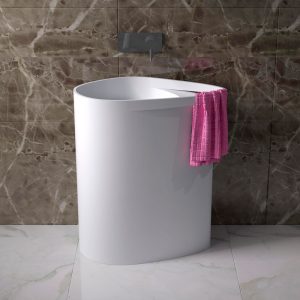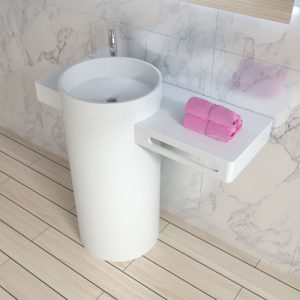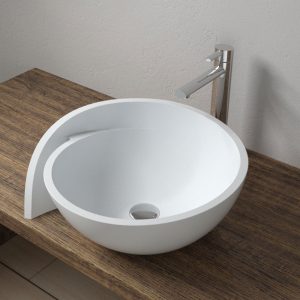We know that stone resin sink are known for their strength and durability, but if you don’t take care of them on a daily basis, it can lead to some damage. Therefore, if you have an artificial stone sanitary ware product at home, it is important to know some cleaning methods for stone resin sink.
1. Operating characteristics
Want to have and stone appearance and custom design, many people will think of products made of stone resin.
stone resin products are cheaper than those made of stone, but also relatively light, very popular with modern families.
Therefore, in the course of daily use, it is necessary for us to take care of them.
What we need to know about the care of stone resin sanitary ware is that the use of corrosive cleaning agents or hard abrasive particles in cleaning solutions can easily damage the shell.
The internal surface of the washbasin is prone to the formation of calcium deposits.
A condition that cannot be resolved even if you have installed a fine filter.
If you have a wash hand basin in light coloured artificial stone,
it is highly recommended that you do not leave unfinished coffee,
beet juice and other colouring solutions on its surface.
If the sink is not cleaned immediately, persistent stains and stains will begin to form on its underside.
It will be difficult to deal with it in the future.
In addition, over time taps cause surface corrosion.
Rusty stains are one of the most difficult stains to clean.
2. Assess the level of contamination before cleaning
For stains that are particularly resistant to staining,
it is recommended to stock up on special detergents designed for cleaning composite surfaces.
Using them is very simple: a small amount of detergent must be applied to the entire surface of the washbasin and rinsed after 10 minutes.
Likewise, any chlorine-based bleach is a good way to resist persistent stains and stains.

stone resin sink
Decontamination will be more effective when using a melamine sponge, which produces a special foam.
When the foam is formed, one fragment of the sponge opens and the other closes,
giving rigidity and elasticity, and this sponge can clean almost any surface.
3. Detergent
Before buying a detergent, make sure it is free of caustic alkalis and acids.
For example, it is not recommended under any circumstances to use liquids or gels to clean stone resin.
Special stone resin washbasin cleaners are usually available in outside hardware shops.
(1) Pemo Lux
This tool will ensure the purity of the washbasin and eliminate unpleasant odours,
however, it is recommended that the powder is not applied directly to the surface of the washbasin and must be mixed with water beforehand to ensure the consistency of the paste.
(2) Chlorinated cleaners
This cleaner for washbasins does not damage the surface of the stone but helps to effectively clean lime deposits from the stone.
For routine maintenance behind the washbasin, a liquid detergent is permitted for cleaning kitchen appliances.
By using it regularly, stains and dirt will not remain on the surface of the washbasin.
(3) Citric acid
Can only be used on light stone resins.
It is perfect for eliminating stains and rust stains from all kinds of colouring solutions.
To use, apply lemon juice or a concentrated citric acid analogue to the stained area.
Leave for 5-10 minutes, then rinse the surface with plenty of water.
You can also use thinly sliced lemon slices that have been left on the spot for a short time.
(4) Use soda water
You can clean black, greasy films and other contaminants.
It is important to pre-dissolve the soda in water and keep it at a thin consistency.
Next, apply the mixture to a rag and distribute it around the sink. Adding soda is not recommended.
Leave for a few minutes, then rinse the surface and you can repeat the process.
4. Cleaning limescale
Water is often present in the kitchen space and can cause lime deposits to appear.
A reliable, quick solution to this problem is to use a special cleaner in the form of a composite or ordinary vinegar solution.
The special cleaning solution should therefore be applied to the entire surface of the washbasin after 10-20 minutes – rinse well.
When cleaning with an acetic acid solution you can follow the following steps.
(1) Wear rubber gloves.
(2) Soak the sponge first in a 9 % vinegar solution.
(3) Wipe the contaminated area with the sponge.
(4) Wait 5 to 7 minutes.
(5) Rinse the surface with water at room temperature.
(6) Wipe the entire surface with a dry, soft cloth.
5. Prevention and use tips

stone resin sink
To maintain the original appearance of your washbasin, there are a few tips to help you with the task.
(1)First of all, do not neglect preventive measures; remove food residues immediately after cooking and wipe the surface with a kitchen utensil’s liquid tool so that no undesirable stains or stains appear on the surface.
(2) Limescale is less likely to accumulate on the sink if it is wiped dry regularly.
(3) There is a constant need to maintain the surface. Polishing and sharpening should also be carried out regularly.
(4) The use of soda will clean stubborn dirt. It will also help to whiten the surface and obtain a whiter shade of stone to polish it with.
To learn more about the stone resin sink, please contact us.














